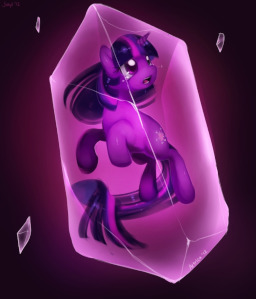
Echoes
Göschenen, the Swiss Alps, 1876.
Henri knelt in the mud, feeling his knees press against the sharp edges of freshly-cracked rock, and leaned forward until the light from his oil-wick cap-lamp crept over the prone man's face.
Antonio. He was definitely dead. Bare-chested, covered from head to toe in rock dust the same dirt-gray as the tunnel floor, he lay staring into space with unblinking eyes. Even the eyeballs, Henri saw, now had a thin layer of gray dust. If it weren't for the blood outlining his head in a black halo, he'd look like a gargoyle that had fallen from the roof of a cathedral.
He cursed quietly. Why Antonio? He was the only one who'd understood, at least a little, what they were doing here—how important it was, to Switzerland, to the world. The ten miles of rock between Switzerland and Italy were Nature's last barrier to Man's dominion over her.
Something glinted on the tunnel floor near the body. Henri bent closer, and saw the flashing reflection again. Acting on instinct, he tilted his headlamp away from it, drawing away the attention of the watching men. Meanwhile he reached out beside himself in the dark to where the glint had been. After a few seconds of feeling around, he found something hard and flat stuck in the mud and gravel. He silently palmed it, then stood up.
"What in blazes happened?" he asked the anonymous lamp-flames that bobbed around him in the darkness. He'd come up to find out why the next blast hadn't gone off, and found the miners clustered around the body.
"Him and Marco were shouting at each other!" Stefano's voice said.
"Sounded like a fight," Paolo added.
It was hard enough fighting a mountain; it always amazed Henri how much energy the men had left to fight each other. Especially in this heat. He wiped his forehead and began taking off his jacket. "Did anybody see?"
No one answered.
"Where's Marco?" Francesco asked. "Don't let him get away!"
"I'm right here," Marco called, nearby enough in the dark that Henri startled at the sound. He sounded tired. His light had gone out.
The other lights quickly converged around Marco, shouting anger and accusations.
"Madonna santa!"
"Why?"
"Killer!"
Henri stepped into the circle of men standing around Marco, and they quieted.
"I didn't kill him," Marco insisted. "What for would I kill him? Was just an argument, is all. I couldn't even see him. He tripped and fell."
Henri turned to face him. "Have a light, Marco," he said quietly, tipping his head forward. His headlamp illuminated the wrinkles that sloped down the sides of Marco's face. They glistened with tears.
Marco leaned forward until their noses nearly touched, and Marco's lamp sputtered into life.
"I didn't," Marco whispered.
They stared silently at each other, not moving, until the rumble of an air car rolled down the tunnel and they both automatically looked down around their feet, checking for railroad tracks. Each took a step back to a more private distance before looking up again.
"Why were you fighting with Antonio?"
Marco's face quickly turned hard. "Niente. Nothing." He threw up his arms in a gesture of helplessness. "I don't remember."
"Nothing?"
"It was about a coin!" Stefano said. "A gold coin!"
"A coin?" Henri turned back to Marco. "Is this true?" As the headlamps turned towards Marco, Henri lowered his hand into the darkness at his waist and rubbed a thumb over the hard thing in his palm. Yes, a coin. He slipped it into a trouser pocket.
Marco sighed, then looked down and nodded.
"Tell me about it," Henri said.
"We were loading the rubble from the last blast into the hopper, me on this side, him on that side," Marco said, pointing. "He called me over to show me. A gold coin. He said it was a big deal, he was going to take it to the big school in Zurich."
"The university," Henri said.
"Yes. That. I told him he was crazy, we gotta keep it secret. It's bad enough, doing this work for the wages we get. If the men thought there was gold? The blasting, the tunnel, it would be"—he chopped the air to his sides with both hands—"finito."
"Hmm," Henri said. "Did you happen to say anything about sharing the coin?"
"Mr. Boucher, on my mother's grave, God rest her soul, that was the farthest thing from my mind. You say every day how important this tunnel is. For the future."
Henri nodded. "I do. It is."
"So we shouted at each other a little," Marco said. "But I didn't touch him! I swear to God he tripped, Mr. Boucher."
"Mm-hmm. So where's this coin now?"
"There," Marco said, pointing at Antonio's body. "Somewhere there."
"What did it look like?"
Marco shrugged. "Shiny and yellow."
"So you didn't actually get a close look at it."
"Like I said, I didn't touch him."
"So you didn't actually touch the coin, either."
"No."
"Or see anything but something shiny and yellow."
Marco threw up his hands, defeated by Henri's logic.
"Paolo," Henri said. He nodded towards Marco. "Search him."
Paolo stepped forward and went brusquely through Marco's pockets, even taking off the man's shoes and checking under his cap, before stepping back and shaking his head. "Nothing."
The other men were already scanning the tunnel floor for the glint of gold. "Thirty francs to anyone who finds me a gold coin," Henri said. They were going to search for it anyway; better they should do it while he was there, pretending to be in control.
He hoped there weren't any more coins. He didn't have thirty francs.
If there were, whoever found them decided they were worth more than thirty francs, for after listening to the scuttling sounds of men scrambling about the tunnel floor for several minutes, Henri saw their headlamps rise one by one and drift back over to where he still stood.
"Now listen up," he said. "There are no gold coins here. We're half a mile—a kilometer below the surface. The first men who've ever been here. The first anything but rock and dust that's ever been here. Not even one God-forsaken breath of air has squeezed its way down here in a million years before today."
Paolo's lamp waved slowly back-and-forth, showing that the miner was shaking his head. "That's impossible, boss," he said.
"What? Why?"
"The Earth, she's only six thousand years old."
Henri frowned. The old Italian knew nothing of Hutton, Lyell, and geological time. He probably didn't even know what the fossils were that he shoveled into the air car's rock hopper every day. All he knew about rocks and strata was which kind were hardest to drill through.
"The point is," he said, "there's nothing down here but rocks and mud and sweat and dust. You can have as much of any of those as you want. But if I hear one word after this—one word from anyone, anywhere, about gold coins in the tunnel—I swear to God I'll fire every man here today."
He gave that time to sink in.
"Paolo, Francesco, Stefano, Udo. Find Antonio's jacket and get him back to the surface. Leave him with the priest. Mind his boots stay on him. We don't bury men barefoot. The rest of you, back to work."
"What about him?" Stefano asked.
"Marco?" Henri looked back over toward the hazy outline he thought was Marco. It seemed to sag. "He goes back to work, too."
"Bless you, Mr. Boucher!" Marco said. "I knew you'd believe me."
"I don't know what I believe," Henri said quietly. "But I don't want the police involved any more than you do. Keep your stories to yourself and keep working. Good day, gentlemen."
He turned and hurried off back down the tunnel, his jacket over one shoulder. He ought to stay and supervise, keep the talk controlled. Marco was right—the men would revolt again if word spread that there was gold in the tunnel. Ten francs a month more than they could make in Lucerne wasn't worth the danger and the hellish conditions. The mountain had literally decimated them; one man in ten who'd worked for him here was now dead.
But first and foremost, the coin had to go. Somewhere no one would find it. Favre would agree, Henri was sure. He had to get rid of it before the police got involved. And, he admitted to himself, he urgently wanted to see it.
The long, slow walk back down toward the surface—the tunnel sloped down, not up, so water would run out—had never seemed so long, the air never so thick and choking. He smelled the entrance before he saw it. Or rather, he began to smell again, to become aware of the stink of his own body, when the weak breeze from the surface brought enough real air that his nose had different intensities of funk to distinguish.
When he finally broke into the sunlight, blinking, he paused to take a few great gulps of air and look down on the little Alpine village below. It had been beautiful until two years ago, when a thousand miners had washed over it like a tidal wave of sewage. He'd often wondered since which smelled worse, the dust and hot sweat of the tunnel, or the shit-strewn mud streets of the overburdened village.
He put his jacket back on and buttoned it up, turned in the opposite direction, and climbed a rocky trail, up the side of the stubborn mountain his men were drilling through. Finally, he came to the small high pasture where he and the few others from the village who weren't too lazy to climb this high grazed their horses during the day. It was freezing cold after coming out of the steamy tunnel, but he wouldn't be long.
"Here, Dynamite," he called. He pulled a few small, shriveled, precious carrots out of a jacket pocket and dangled them in the air. A bay stallion raised its ears and trotted over.
"Good boy," he said, stroking the horse's muzzle as it chomped on the carrots. He was too tired to mount, but he had only a short distance to go anyway. He walked out to the end of the pasture, a small hillock held in place above the valley below by the roots of the edelweiss as much as by the unstable rock beneath. Only then did he stop and take the coin out of his pocket.
He spit into his palms and rubbed the remaining dirt off of the coin. Gold? Probably. It wasn't tarnished, anyway. He tilted the coin this way and that in the sunlight. A stamped image of a six-pointed star—not the Star of David; its points were sharper—was still faintly visible. In the center was a single line, the universal symbol for "1".
He turned it over and squinted. A face looked back at him, a man wearing a crown bearing that same star. It took him a few seconds to recognize; the man's features were so distorted that at first he thought the coin was damaged. The eyes were too big and too far apart, the nose too long, the ears much too high on the head. Oddest of all, the man was smiling, a thing ancient monarchs were seldom known for.
Dynamite had followed him over, still munching the last carrot. Two mares trotted over curiously.
"Sorry, ladies," Henri said. "I've got nothing for you." He raised the hand holding the coin. "Just an old hunk of metal."
All three horses pricked their ears up. They followed the coin with their eyes as Henri brought his hand down again.
"Who are you?" Henri asked the face on the coin. "And how did you get in my tunnel?" Henri hadn't studied history, but he knew there was nothing like this in any of the museums in Zurich or Geneva. The coin might really be, as poor Antonio had said, a big deal.
That only made it worse, of course. The most-powerful people in Zurich were tired of cost overruns, and looking for any excuse to shut the digs down. This coin was that excuse. But this was the only place anyone could tunnel through the Alps, and Favre was the only man who could do it. No tunnel, and the two halves of western Europe would stay divided. Mankind would march into the future as it had marched through the past: wearing jackboots and waving flags.
"I'm sorry," he said. "Your one chance to be remembered, and you had to show up here."
The coin did not reply.
"But men died for this tunnel," Henri went on. "Antonio died for this tunnel. So I'll be damned if I can't throw away a coin for it."
He walked up to the edge, pulled his arm back, and flung the coin far out into space. He watched it flash three times as it fell silently into the scree on the cliffs below, followed by three pings that echoed back from the opposite promontory like tolling chimes. He thought maybe he should say a prayer for the smiling king he had condemned to be forgotten by the human race. But it had been too long since he'd prayed.
"You were a leader of men," Henri muttered as he turned back toward the horses. "You'd do the same if it were my coin and your–"
He stopped, mouth open.
All three horses stood in a row. Bent low, one foreleg tucked up beneath each chest, their muzzles nearly touched the dirt in a sort of bow. They stood as still as the mountain itself.
“Now where,” Henri asked, “did they learn to do that?”








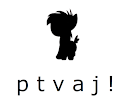

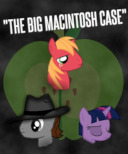
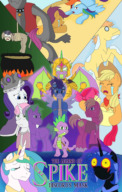


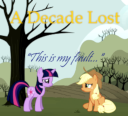
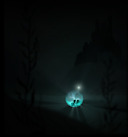


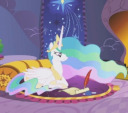
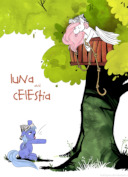



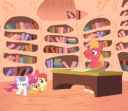
Dear God, how I hope somebody discovers this place again...
Well...huh. Gud ending
I'm glad I tracked this for however long I've waited for this fantastic conclusion!
On all but the last chapter:
Beautiful; thank you for posting that blog post that got me to get to this. :)
Might have had more to say on that, but...
On the last chapter:
I unfortunately found this to be less the beautiful sort of tragedy (Would that term even apply (to the earlier chapters)?) and more the frustrating sort where bad things happen both more than good and for no good reason (though I do see the characters as having understandable motivations based on their knowledge and beliefs).
(I'll also mention that I enjoyed some of the period details.)
"No tunnel, and the two halves of western Europe would stay divided. Mankind would march into the future as it had marched through the past: wearing jackboots and waving flags."
Had this tunnel truly lead to some great new era of peace and friendship, as Henri believed, I think Twilight would approve. And while one tunnel being that good might be a bit of a stretch, I can see Henri in 1876 making that stretch, to a noble goal if perhaps not without a bit of hubris.
Trouble is, this is 1876. He thinks jackboots (presumably (after I did a bit of research) because he doesn't like Imperial Germany much) have negative connotations now? Both world wars are still in the future. All of this is still in the future, and that's just in Europe. The Gotthard Tunnel did nothing to stop that. In placing such hopes on this project, Henri is terribly, terribly mistaken... and yet because of those hopes, he's probably going to destroy or hide the crown, too.
And even worse, what would have happened if he hadn't? If this had become one of the single greatest discoveries in human history? Evidence that we were not the only sapient species to walk the Earth?
No guarantee it would have changed anything for the better, certainly, that that would even be uncovered or believed, but I think it unlikely it would have made things worse. And so Henri, with his knowledge instead of ours, may well have taken a great step away from his goal with the action he thought was towards it, instead of simply destroying a priceless treasure for a lost cause.
(Still find the earlier chapters beautiful (I think they're not taking significant overall damage from what follows), but my mind isn't currently in the same space to comment on them.)
...And also, typing this lot out seems to have improved my feelings on the whole story and appreciation of the last chapter, too, so that's good. :)
And this definitely seems to have been a story provoking some thoughts. :)
edit:
(Oh, and by the way, was that the Permian-Triassic extinction event? From a bit of research, looks like the continents in that image might be in about the right places...)
Wow... I actually got emotional at the last two chapters... Great work.
10028735
You found a secret message!
That was deliberate. From the afterword to "Moments" in Worst of Bad Horse:
It then goes into a discussion of premature convergence, a common problem in software that uses genetic algorithms. In a genetic algorithm, you try a bunch of random approaches to a problem and see which one got the farthest. Then you take a semi-random sample of the approaches that got the farthest and mate them, making new approaches that combine them in some way. You keep doing that until you solve your problem.
Intuitively, you'd think that letting any approach mate with any other approach would give you a good solution fastest, because you want the best of the best. And it does--for a while. You get a pretty-good solution very fast. But then you stop, because your gene pool has converged. Every individual in it has basically the same "genes", because that sorta-good approach spread quickly. And that means you haven't got any more raw material to work with to evolve any farther.
It's like what happened when FM radio became popular around 1970. From Wikipedia:
After the creation of nationwide FM radio networks that broadcast the same music, any song, from any part of the country, could become a nationwide hit. It didn't have to be recorded in London, New York City, or Chicago. That was a time of lightning change in American music, taking us from 1960, when people listened to the Everly Brothers, Pat Boone, Elvis, and Patsy Cline, to 1970, by which time the Beatles had come and gone, and people were listening to Jimi Hendrix, the Rolling Stones, and Led Zeppelin.
And then it stopped. By 1990, innovation in mainstream American rock and roll had run its course. It's easier to tell a pop song written in 1962 from one written in 1966 than it is to tell a pop song written in 1990 from one written in 2020. Because by 1990, all the people writing songs for the radio were imitating the same songs, and they all got stuck at the same dead-end of 90's ironic-hipster rock.
More dramatically, during the same time American mass culture was exported to the rest of the world, and by 1985 people were wearing blue jeans in Moscow and listening to Abba in Beijing, and music around the world began to start sounding kind of the same, as local styles were washed away by a tidal wave of American pop-culture.
This works into one of the main themes of Worst of Bad Horse: the contrast between rational approaches to problems, which think in terms of binaries (yes/no, good/bad) and propose radical changes; and empirical approaches, which use numerical measurements to make incremental improvements. My examples from pop music are about diversity (how many different types of music coexist) and connectivity (how far and how fast these styles travel and mix). It turns out that diversity and connectivity--in today's political terms, cultural representation and immigration--aren't "good" or "bad". They're parameters which can be adjusted intelligently. Sometimes more is better, and sometimes less is better. Cutting off the flow of immigration that builds diversity is always bad in the long run; so is opening the spigot. This isn't because of our particular culture or history; it's because of math, and it would be the same for a species half the universe away, in a galaxy made out of dark matter.
So arguments over policy (immigration good / immigration bad) are stupid and ignorant. We need arguments over measurements and numbers, leading not to a yes/no policy, but to an equation. which would specify a good rate of change in immigration rate as the partial derivative of some function of some measurement of diversity.
Wait, this wasn't finished?
10029009
Oh, neat!
And thanks for the quote from the afterword. :)
(I have the book sitting on my shelf, but it's thick and I'm low on time at this particular moment. :D)
And the further, and further-ranging, commentary! :)
...Actually, in the process of reading that, interrupting myself for another thought:
Without the tunnel, without that striving, doomed though it may have been as far as its high moral purpose, would the artifacts have been found at all? Quite possibly not. I'm suspecting that may be another part of the secret message.
(And I did then finish reading it after, to clarify. :))
10029503
Now it is! Because my new head-canon is that I intended that.
10029834
Hah, well, headcanon retroactive intention away, then! :D
Thanks. :)
Every once in a while I did look at moments and question its Incomplete tag. Glad that it's now completed with this fine resolution.
Also I really gotta check out more of those Afterwords--they're a real pleasure to read and reflect upon.
It's finished!
Does that mean that earth horses somehow related to ponies?
8903297 )
)
I'm not sure if you still care, but I'm sorry: I should have clarified misunderstanding immediately. (instead I've thought for some time that I can easily prove something interesting here, poked around for couple of weeks, and then, of course, I forgot
I formalized incomplete information state as pair of probability spaces
\mathcal{C}and\mathcal{L}. We take samples:(all samples are taken independently from same distribution because "no bayesian updates" condition). Pure outcome of
i-th loop for decisiond_i \in \mathcal{D}is:From what it looks, that should be enough to capture all sensible scenarios.
The central question (in my opinion) is: what sensible ways there are to define preference ranging on mixed
n-loop outcomes (which may be, or may not be, defined by utility functionU(o_1, o_2, \dots, o_n)) assuming preferences for 1-loop outcomes defined by known utility functionu(o)?Now, if we assume:
(or any positive linear combination really) it immediately follows:
exactly as you've pointed before. But I don't see any deep philosophical reason for why
\sum_{i = 1}^{n} u(o_i)is better then\max_{i = 1}^{n} u(o_i), for example. Only sensible preference constraints I could think of are:Both
\maxand\lnexamples hold these conditions. Moreover, judging from that there is decision-switching point in the story and it makes intuitive sense, there should be diminishing returns.What I've meant about "it's not important if we are looking at full series or a single time loop" is following: instead of 2-loop lottery with utility function
U(o_1, o_2)we can always treat it as two separate 1-loop lotteries with utility functions (correspondingly):(
d_1is already known at the moment of second lottery --- we can't condition on any additional information aboutcandl_1, but we can condition on our own previous actions). And then we can usev_1(o_1) + v_2(o_2)as utility function for 2-loop lottery and get the same policy back. Of course similar trick works for more than 2 loops.I hope that clarifies what I've written below!
* After writting that explicitly, I realized that there's way to break VNM framework: just forbid to condition on own previous actions. The problem becomes a bit more "game-theoretic" where agent plays against clueless itself and mixed strategies are quite possible. But that doesn't have direct analog in the story.
I think that's kind of uncertainty that would always be present: it's not like she's given numerial value of how much she's won after each iteration. That consideration originally gave me idea for ln(1 + sum r_i) example.
10056427
Unfortunately, the "quote" on fimfiction won't quote math symbols.
The part you wrote which says:
Right. That was my point. The theorem assumes that sum-of-utilities is better, and uses that assumption to conclude that sum-of-utilities is better. Which is why the theorem is bogus.
I don't understand what you wrote after that, with your equations for v1 and v2, except that those are indeterminate because each equation relies on already having the value of the other.
But you don't need to think about time loops, because the theorem doesn't have any time component.
Probability of outcome X in the original theorem is equivalent to fraction of time loops in which you get outcome X.
Order is irrelevant as far as the VNM theorem is concerned.
It probably would, in a materialistic universe. It seems quite a stretch to suppose that horses would have any connection with Equestrians, given that--as the story says--the entire category of land animals was shorn from the evolutionary tree of life.
But Equestria has magic, which is defined as non-material causation, which I think is defined as causation which can in principle never be understood.
So: Yes, they're connected. It's magic.
This will be unsatisfactory to those who want a story world to be logically consistent, but magic is inherently not logically consistent. If it were, we wouldn't call it magic, just as people didn't call it magic that a compass always points north, even though for centuries they had no idea why it did.
It's a little unsatisfactory to me, but I think the dramatic effect is worth its price in logical consistency. Though possibly harmful to impressionable young minds.
10056427
Actually, the VNM framework forbids conditioning on what you're calling previous actions, because in the VNM framework there is no time. There is only 1 action and 1 outcome. The time loops in this story are alternate universes. To use the VNM, Twilight has to assume that the order they appear to come in to her is irrelevant to utility, and so she can't condition on her previous actions.
10058653
Well, there's time here in the sense that agent can not condition on outcome (obviously). But that 1 action may be to decide which strategy to use, where "strategy" (or "policy") is a function from history of agent's interactions with environment to next action (or probability distribution on next actions for mixed strategies). If I remember correctly, strategies that do bayesian updates and maximize posterior expectation of something are usually considered in such cases because they are just going to win due to Wald's theorem about admissible decision rules. In the same sense I was kinda wrong before: game theory doesn't actually break VNM framework, it just makes additional assumption that other players can predict agent's strategy, and mixed strategies arise as a result of regular expected utility maximization.
I don't understand: do you mean that she shouldn't condition on anything that happens in other loops (own decisions included), or that she shouldn't even condition on the information that there are other loops?
I don't understand where sum of utilities in assumptions comes from. The theorem states that either agent behaves in a way that maximizes expected value of some function (expectation is relative to agent's state of knowledge of course), or there's counterexample for one of axioms (with ponies, yay!) in agent's behavior. Twiggles' subjective bayesian probabilities are not same thing as actual outcome frequencies.
All theorems are glorified tautologies
Expression for
v_1doesn't have free variables (exceptUandO). What I've meant is if:(and
v_2, indeed, implicitly depends onD_1here) then:Although now I realize that's a pretty complicated statement and I'd better prove it (it would be funny if that's not actually true )
)
Ponies seem to expect predictable results from using magic.
vignette.wikia.nocookie.net/mlp/images/8/8a/Twilight_and_Starlight_pour_magic_into_the_thrones_S6E12.png/revision/latest?cb=20160612110650
Guess they use word "magic" a little bit differently?
10072526
I think so. See Fraud!
10029009
I object to the implication that policy is a binary choice, but I suppose that semantics slapfight is a different topic.
I'm very glad I was in a position to spot this update, however belatedly.
10072526
And of course that is exactly what has happened
No idea what I was thinking before.
Decision
D_1for the first lottery should be:(it's actually maximizing deterministic payoff)
And then for the second lottery:
And that obviously implies:
Great story!
10029352 It was finished, but... see the "Author's Note" after this chapter.
10228621
I aspire to check this math someday...
I came down with terrible sciatica in May 2020 and had to stop sitting at the computer so much, and I never got back to all the online dialogues I left hanging in the summer of 2020.
10675137
Ouch. I hope it isn't chronic and got better since
I really hate that I can only favorite this story once. It's a perfect blend of bittersweet, I feel. Genuinely wrings at my heart. Someday I hope to write something this beautiful.
10675528
It is better now! Careful, regular exercise of my back muscles, abdominal muscles, and leg muscles keeps it in check. I also built a system which lets me use my computer while lying in bed, though it slows me down then typing.
I came back to this again, just recently. I hadn't realised there was an extra chapter added, though I was sure I was tracking it. It's an interesting coda; the style is a little like The Best Of All Possible Worlds (which is to say that the writer lives up to a standard that I feel few can approach - like the rest of the fic), though that might just be an artefact of the era involved. Or the focus on the coin. Regardless, it feels like it should fit into some sort of Voltigian Expanded Universe affair.
Anyway. I'm glad you decided to include it here, rather than in a compilation somewhere. It works so much better as a coda.
3885631
BTW, you already know this if you've read the last chapter, but that was a really good guess.
This was a fantastic read, made me tear up.
I have to say, Author, this is the first time in a while that I’ve come across a story where Equestria is Earth in the distant past. Even though I’m a practicing Christian, I still find the idea an incredibly interesting one to think about. Though, honestly, I am not a big fan of it since I lean more to Equestria being a far-future version of Earth than the other way around. (Remember Anthropology? lol)
When I first came across this, I was surprised that you added a chapter back in 2020. I honestly was expecting the chapter to take place in the modern era, but the late 1800s works, too. Another thing I found cool was how you added a small mention of the idea of Earth being 6k years old, which is fairly accurate to what many (but not all) people believed in back in the day. At least, those who lived in the Christian or heavily Christian countries.
All-in-all, fantastic story, Author! I’m going to place this in my folder, The Bookshelf of Inspiration. Good work, and may God bless you this Christmas and beyond 2024!
-Davidtin, user of Fimfiction